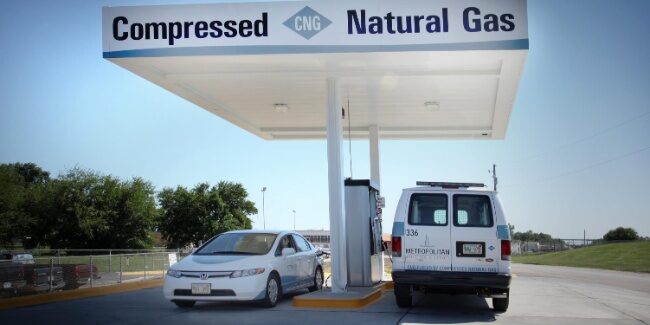To lessen its carbon footprint, Tanzania is adopting the use of vehicles that run on compressed natural gas (CNG). Plans are underway to set up CNG refilling stations in Dar es Salaam, Morogoro, and Dodoma cities. Tanzania’s $42 billion Liquid Natural Gas (LNG) project makes the transition to natural gas-powered vehicles a viable initiative.
A new revolution to reduce carbon footprint is underway. The government is rolling out a plan to cease the use of crude oil for its government vehicles. This is part of a larger national initiative to reduce carbon footprint and adopt a more environmentally friendly system. Instead of oil, the Tanzania Government Procurement Services Agency (GPSA) will now purchase vehicles that run on compressed natural gas (CNG). A CNG vehicle is a car powered by natural gas rather than gasoline or diesel fuel. These cars are not specially manufactured to use CNG.
Instead, automakers modify existing gasoline-powered vehicles to operate on CNG. Additionally, there are CNG hybrids that can run on both natural gas and gasoline. Due to this dual capability, these bi-fuel vehicles offer flexibility. This allows them to operate even in areas where a CNG refueling station is not available. CNG refilling stations to power green vehicles This brings us to the question of investing in the setup of the necessary CNG filling stations.
To this end, the government, in collaboration with the Tanzania Petroleum Development Corporation (TPDC), is investing in pilot CNG refilling stations in Dar es Salaam, Morogoro, and Dodoma. TPDC revealed in March of this year that it has issued licenses to approximately 20 companies to construct CNG stations. A total of nine CNG stations are expected to become operational by 2025.
“The preparations for the project are progressing well. Soon, the government vehicles will transition to using green fuel, CNG, which will play a significant role in reducing fuel costs,” said Peter Mayila, the Acting Head of Communication and Marketing at GPSA. Mayila noted that the government aims to reduce expenses.
This will be a welcome move given the rising cost of oil globally. Switching to CNG is therefore considered one of the best alternatives in adopting green vehicles. Tanzania has already concluded discussions with investors in a $42 billion Liquid Natural Gas (LNG) project, making the transition to natural gas-powered vehicles even more viable. Furthermore, Tanzania’s Works and Transport Minister, Makame Mbarawa, has announced that the government is contemplating a subsidy program for CNG vehicles. In addition to government vehicles, Tanzania is investing $65 million to convert approximately 8,000 cars and rapid transit buses to run on natural gas.
The project goes a step further, with over 30,000 households in Dar es Salaam expected to have access to CNG for cooking by 2025, according to the Minister. A number of African countries with natural gas-producing regions are shifting towards domestic use of this resource rather than just exporting. Conversion of vehicles to CNG Even countries that traditionally imported natural gas are increasingly promoting its use in their transportation sectors, leading to the conversion of more vehicles to green vehicles.
In neighbouring Kenya, for instance, the private sector is taking the lead in capitalizing on this emerging market. Proto Gas company has been investing in CNG conversions in Nairobi since 2020. Also read: US and Tanzania celebrate first-year success of USAID Feed the Future project “The cost per litre of diesel versus that of gas is one such cost-cutting element,” said Elijah Karuri, the technical lead at the company’s CNG conversions unit. “In Kenya today, a litre of natural gas costs just about $0.56 (Sh85), while a litre of petrol is about $1.45 (Sh217).”
The CNG conversion expert pointed out that CNG-powered vehicles offer an advantage. They have lower maintenance costs and considerable technical efficiencies compared to regular internal combustion engine vehicles. Nigeria, Egypt also embracing green vehicles On the West coast of the continent, Nigeria has approved widespread use of CNG-powered vehicles. Nigeria, which has the largest natural gas reserves in Africa, has the capacity to pioneer green vehicle revolution.
“Nigeria will establish autogas conversion plants/kits in all states in the short term,” announced Vice President Kashima Shettima said in July. At present, there are plans to deploy a total of 11,500 CNG buses throughout Nigeria. Furthermore, the Nigerian government has set a target of having 1 million CNG-fueled cars on the road by 2027. In North Africa, the Egyptian government has successfully converted more than 103,000 cars to CNG to date.
Additionally, the country boasts a network of nearly 700 operational natural gas refueling stations nationwide. The plan is to have 1000 stations in a few years. Recent data indicates that Egypt is on track to produce approximately 8,000,000 tonnes of LNG this year. Furthermore, in January 2023, Egypt made a significant announcement regarding the discovery of a new gas field in the Narges area, situated in the Eastern Mediterranean. Also read: AfDB’s US$2.5M grant to support 10k small horticultural businesses in Tanzania As more African countries transition to green vehicles, the continent is progressively becoming greener.
However, the international community still owes Africa a substantial debt to assist with this energy transition. Africa contributes the least to the current global greenhouse gas emissions. It, however, bears the biggest brunt of the resulting negative effects of climate change. The international community can play its role by funding Africa’s energy transition. One of the ways could be financing the adoption of green vehicles
![]()




